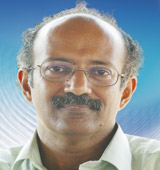Though I come from an urban
middleclass background, the family's
history is not all that typical. My
father and his elder brother had both
taken part in the freedom struggle as
youngsters, been attracted to
Communism, spent time in jail and
subsequently went "underground" as
a result of their espousal of
revolutionary ideas. However, by the
time I was born, my father had
decided to "settle down" to "normal
life", giving up politics and was
working as a journalist.
Unfortunately, he died when I was
just nine, giving me very little
opportunity to learn from him. Still,
he left behind a legacy that influenced
me.
I had great pride that my father was a
freedom fighter and this in turn
predisposed me to take interest in
society at large. I was taught to revere
the great leaders of the freedom
movement. I still remember, as a six
year old, clutching my parents' hands
and walking in a silent procession in
Madras to mourn Pandit Nehru's
death. During my high school days,
history was a favourite subject and
the freedomstrugglewasmy favourite
topic. I used to feel a sense of loss that
Iwas born after the excitementwas all
over and could only read about it.
My mother, though from a more
conventional background, was one of
the first women of her times to get a
PhD in a new discipline like Biochemistry.
Her elder sister had been
bold enough to marry a Muslim
against the family's wishes and had
even been disowned by my maternal
grandfather. My aunt actually
attended my parents' wedding as my
father's invitee when he heard the
story from my mother. Thus there
was a strong streak of idealism and
progressive thinking on my mother's
side as well, though her family had
neither involvement in public life nor
taken to revolutionary ideas.
The untimely demise of my father at
the age of 39 left my mother a young
penniless widow with three children
(my two younger sisters and me) to
bring up. We had to fall back on the
support of my mother's siblings for a
couple of years before my mother
could establish herself in the
academic world as Professor of Biochemistry
and independentlymanage
the task of bringing us up. This
trauma in her life and the subsequent
struggles to overcome the challenge of
providing for us, made my mother
somewhat risk averse and she
worked hard to ensure that I got my
engineering education and my sisters
got their medical education.
Another influence in my life was my
father's elder brother who remained
life-long in the Communist Party and
was an active politician right
throughout. Through him I got
glimpses of the public sphere and
access to radical literature. Though he
had chosen public life, he did not
wish that I also join public life. He
was keen that I go to the Soviet Union
(using his contacts in the Party) for
my higher education in engineering
and technology. So, both my mother
and paternal uncle were keen on a
professional career for me eschewing
all risks that my father (and uncle)
had taken in their lives.
College Activism and Exposure
to Radical Ideas
During my college days I had been
attracted to development work as a
result of my association with
"service" organizations like the
University YMCA and the Rotaract
Club. Strictly speaking, these were
not radical organizations but they
gave me an opportunity to meet
people from different walks of life,
develop organizational and
leadership skills. It is my reading that
really made me interested in radical
ideas. A voracious reader of
children's books and later on thrillers,
I found the five year engineering
course in a Government College a
great opportunity to learn everything
other than engineering. I devoured
books on popular science, sociology
and politics in addition to my
addiction to "lowbrow" thrillers.
The late 1970s was a period of great
ferment in India with farmers' strikes
and a general restlessness among
various sections of society and I was
anxious to understand the problems
and issues facing Indian society. I also
got attracted to socialist ideas that I
picked up from library books written
by "western" authors rather than the
official publications of the Soviet
Union that adorned my uncle's
bookshelves. In that sense I did not
"inherit" my early left orientation
from my father or uncle.
Chance Factors
Despite this interest in the world
around me and a leftist orientation, I
had no clue on how to act on my
ideas and inclination. Politics had a
certain fascination, but I had no real
conviction that any of the leaders or
parties were worth following. I was
fascinated by the rural situation, but I
was too well entrenched in my urban
middleclass existence that there was
no real possibility of doing something
radical. In this situation, it was but
natural that I also tried to follow the
path that my engineering classmates
were taking: writing entrance tests for
IIMs, attending job Interviews for
public sector companies and even
taking the IAS preliminary exams.
Influenced by some close friends, I also took the TOEFL and GRE and
was keen on doing higher studies in
engineering at some US university. I
actually got very good scores in both
TOEFL and GRE, better than some of
my friends who actually made it to
the US.
